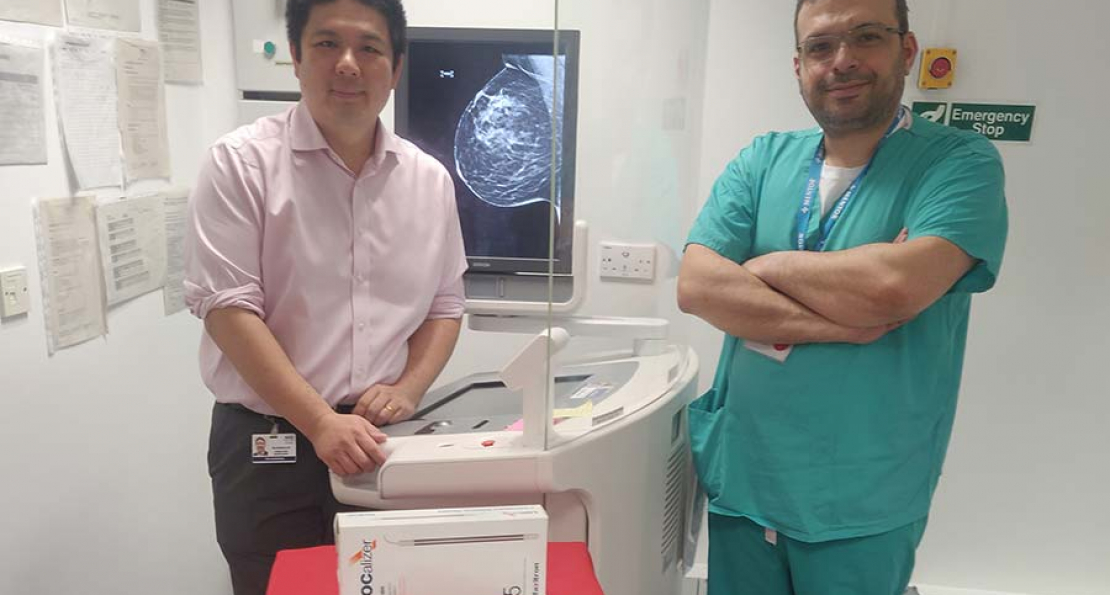Friends of ANCHOR has fast-tracked funding that could bring significant benefits to breast cancer patients and the surgical teams treating them.
In anticipation of the extremely busy period expected to befall staff at Aberdeen Royal Infirmary over the coming months, the organisation has pushed forward £27,135 worth of funding for radiofrequency breast tags and detector probes, which are used to prepare patients for surgery to remove breast tumours.
Dr Gerald Lip, clinical director for the North-east of Scotland Breast Screening Programme, applied for the funding at the charity’s February committee meeting alongside his colleague Mr Yazan Masannat, consultant breast surgeon at ARI.
Dr Lip said: “This is new technology which we are the first to introduce in Scotland, and it will make a significant difference in patients’ pathways and management. This new method is far more comfortable for patients and allows for even greater accuracy during surgery – and it has the potential to considerably streamline the process for both patients and the surgical team. We are extremely grateful to Friends of ANCHOR for accelerating the funding process.”
The radiofrequency tags are implanted into suitable patients who require breast surgery to remove a tumour. They are appropriate for some, but not all types of breast cancer operations. They work by emitting radio signals which are detected with a sensor in the operating theatre to allow for more accurate surgery.
The radio waves stay active for 90 days, meaning the tags can be placed in patients up to three months in advance of their surgery date, helping to streamline the patient pathway and allow for more flexibility.
Under the current system, patients due to have surgery must have an additional procedure carried out on the same day as their admission, where a metal ‘guide wire’ is inserted into the tumour prior to going into the operating theatre. This can be time consuming and is dependent on having a consultant breast radiologist available on the day of surgery. It can also be uncomfortable for the patient and can increase feelings of anxiety, while there’s a chance wires could become dislodged.
Mr Masannat said: “With the current pandemic situation, placement of the tags will reduce patient visits to the hospital and their time in the hospital itself, allowing for surgery and discharge on the same day for some patients.”
“Currently in NHS Grampian, there are more than 450 new breast cancer patients per year, with more than 200 operations a year requiring the current localisation method. The practice has already proved successful in hospitals in Newcastle and Gateshead so the team in Aberdeen is eager to get started.”
Jim Milne, chairman of Friends of ANCHOR, said: “In light of the current pandemic and expected patient numbers to ARI, the committee voted unanimously to fast-track this funding application. Our remit first and foremost as a charity is to contribute in a meaningful and responsive way to the care and support available for cancer and haematology patients, and we could not ignore the further benefits that would be brought by making this investment in a timely manner.”
In the immediate future, the strategy proposed by the breast symptomatic department is to place tags in all patients who are due to have surgery, helping to create flexibility in planning their surgery, reducing contact and decreasing the risk of cancellations. In contrast to the method currently used, the placement of these small tags only requires a modest, temporary dressing to cover the insertion site, where the previous method would see the guide wire protruding from the patient.
Mr Milne added: “This investment will bring significant improvements for patients and professionals alike and we’re very pleased to be supporting it.”
In the future, the equipment could also bring benefits for patients in Shetland, as well as at Stracathro Hospital where some breast surgery is also being performed, as most patients from those areas currently travel to ARI for their surgeries. With the tags implanted in Aberdeen in advance, patients’ surgeries could be carried out closer to home on a day-case basis.


